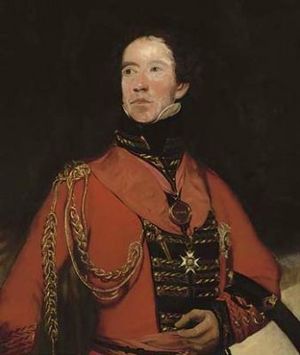William Lumley facts for kids
Quick facts for kids
Sir
William Lumley
|
|
|---|---|
 |
|
| Born | 28 August 1769 Lumley Castle |
| Died | December 15, 1850 (aged 81) Green Street, Mayfair |
| Allegiance | United Kingdom |
| Service/ |
British Army |
| Years of service | 1787–1850 |
| Rank | General |
| Unit | 10th Light Dragoons |
| Commands held |
|
| Battles/wars | |
| Awards | |
| Alma mater | Eton College |
| Other work | Groom of the Bedchamber |
Sir William Lumley (born 1769, died 1850) was a brave British Army officer. He also worked for the Royal family. He was the son of the Earl of Scarborough. William quickly moved up in the army because he was known for being courageous and professional. He fought in many places like Ireland, Egypt, South Africa, and Spain. After leaving the army in 1811 due to poor health, Lumley became the Governor of Bermuda. Later, he worked for the Royal Household. He is especially remembered for his actions at the Battle of Antrim. There, he saved many important people and was badly hurt leading a cavalry charge. This happened during the Irish Rebellion of 1798.
Contents
Early Army Days
William Lumley was born on August 28, 1769. He was the seventh son of Richard Lumley, 4th Earl of Scarborough. William went to school at Eton College. In 1787, at age 18, he joined the 10th Light Dragoons as a cornet, which is a junior officer rank.
Back then, officers could buy their promotions. This helped Lumley rise quickly. By 1793, when the French Revolutionary Wars began, he was a major. In 1795, he moved to the 22nd Dragoons as a lieutenant colonel. In 1798, he was sent to Ireland. His job was to help stop the Irish Rebellion of 1798.
Fighting in Ireland
During the rebellion, Lumley's regiment patrolled the countryside. On June 7, 1798, he was in Antrim. The town was attacked by about 4,000 rebels. Lumley commanded the cavalry. The first rebel attack was pushed back. Lumley's cavalry tried to chase them away with a charge. But the cavalry were attacked by rebels with long spears. Lumley was badly wounded. Luckily, more soldiers arrived from Belfast and scattered the rebels. Lumley's charge gave time for the other soldiers to escape.
Napoleonic Wars Service
Two years after the rebellion, Lumley had recovered from his injuries. In 1801, he led his regiment in General Abercromby's invasion of Egypt. They helped force the French army there to give up. In 1802, Lumley's regiment was disbanded. He then commanded another regiment until 1804. He even convinced over 400 of his men to join the army again.
In 1805, Lumley became a major-general. He commanded a group of soldiers in London for a year. Then, in 1806, he volunteered to go to South Africa. Lumley fought at the Battle of Blaauwberg. This battle helped the British take control of the colony. The next year, he joined General Whitelocke's force. This force invaded the River Plate area in South America.
Battles in South America
Lumley was involved in the Battle of Montevideo (1807). The city was captured by the British. But the army had to leave when their attack on Buenos Aires failed. Lumley was not blamed for this failure. In 1808, he commanded a cavalry group in a small British army. This army landed in Sicily and then invaded Italy. They captured Ischia but could not hold it. They left Italy in late 1809.
Peninsular War Campaigns
Even though another mission failed, Lumley quickly volunteered for more service. He joined Sir Arthur Wellesley's army in the Peninsular War in 1810. He took part in the campaign that led to the Second Siege of Badajoz (1811). He led an attack on a part of the city called the San Cristobal bastion, but it was not successful.
Battle of Albuera
During the start of the Battle of Albuera on May 16, 1811, Lumley took command of the Allied cavalry. This was ordered by Sir William Beresford. In the battle, Lumley's cavalry supported the Allied soldiers. A few days later, Lumley was in another cavalry fight at the Battle of Usagre. Two French cavalry groups were trapped and almost completely defeated. However, Lumley's health was getting worse. In August 1811, he was sent home due to illness. He never fought in a battle again.
Later Life and Retirement
Lumley spent several years getting better from his illness. In 1812, he became a Groom of the Bedchamber for the Royal family. This was a position in the Royal Household. In 1814, he became a lieutenant general. The next year, after the war ended, he received a high honor called Knight Grand Cross of the Order of the Bath.
In 1819, Lumley was made Governor of Bermuda. He held this job until 1825. He left the position after some disagreements about his duties. During his retirement, Lumley was an honorary colonel for several regiments. These included the Royal West India Rangers and the 1st King's Dragoon Guards. He was promoted to full general in 1837. He retired from all his duties in 1842. Sir William Lumley passed away in December 1850 in London.

